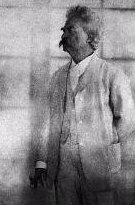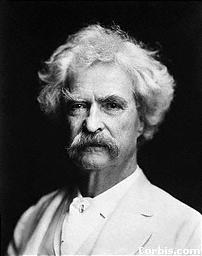

Mark Twain's childhood has been described by some as torrid and by others as lucid. Mark Twain grew up on an Indian reservation in central Oklahoma. He was adopted by a loving Indian couple who changed his name from Samuel Clemens to "Mak Twain", an Indian phrase loosely translated as "the second little abandoned boy". It is therefore believed that Mark Twain has a brother, although the presumed first little boy might not have been related.
It was on this reservation that little Mark first learned to speak, and first learned about bullfrogs. The following is a short anecdote as retold by a decendant of a doctor who once visited the reservation.
"I remember a young lad who would constantly run around in circles and then let out a loud croak. His parents called him Mak, but the other children referred to him as 'Little Bullfrog'." -- Peter Hailding
Mark Twain attended school on the reservation until the age of 12, when his family moved to Sarasota, Florida. The only records of Twain's family are the school records and some invitations to his Bar Mitzva. He finished high school in Sarasota and attended the University of South Carolina at Quarzdale, but dropped out after only two years.
After dropping out of the University, Mark travelled west to find fortune and fame. Twain stopped in Roanoke, Detroit, St. Louis, and Carson City, and finally settled for a time in Sacremento. He got a job running a printing press for the local news paper. But, unfortunately for Mark, he was accused of stealing ink and was fired. Furious, Twain moved back East. Later records show that a fellow employee had actually stolen the ink, but alas, Mark was already gone.
For years it was thought that Mark Twain had captained the riverboat "Missisippi Queen" at the age of 26, shortly after leaving Sacremento. However, this was not the case. As was the custom on riverboat lines of the time, employees of the The Riverboat Company used employee numbers. Mark Twain's number was 10559 while his fellow employee and friend, Jason Green, was number 18559. Green went on to become captain of the "Jesuit Lady" while Twain's career was somewhat less illustrious, leaving the company a mere 3 years later having been only a dockworker and clerk. Company records, however, were smudged causing historians to at first read 10559 (Twain's number) rather than 18559 (Green's number). This is why it was believed for so long that Mark Twain was the mighty riverboat captain, but you know what I mean.
Having left The Riverboat Company, Twain began his life of philanthropy. Twain remained in Missouri, but moved to the small, very poor town of Edburg, Missouri. In fact, this town was so poor, it had been nicknamed "Hungryville" after the war. Twain immediately recognized the need of the people of Hungryville and perhaps for the first time in his life found a purpose. Twain's work at Hungryville to try and bring the people a life of prosperity may be responsible for the Steinbeckian overtones in his writings.

Although not yet widely recognized, many students of American Literature believe that many of Twain's passages are actually puzzles. The answers to these puzzles may be clever riddles or the locations of the Clemens family's fabled riches. Most historians disagree, but researchers at the University of Central Missouri have recently discovered a pattern in his writings that they say is undeniably a puzzle. This may also explain the occasional use of random phrases and words that appear misplaced to those of us who aren't "reading between the lines".
For example, Mark Twain once said "The reports of my death have been greatly exagerated." If we take the first letter of each word in this quote, TROMDHBGE, then translate by one letter so that A->B, B->C, etc. We get USPNEICHF. Rearranging, his message was "U Spin, Chef". Similar tricks can be applied to many of Twain's passages.
Little is known about Twain's declining years. However, it is known that on his death bed he said "He beat me." Twain was referring to John Steinbeck who was born on the same day as Twain, July 4, 1842. What Twain did not know was that Steinbeck had actually died the night before, meaning that Twain actually outlived Steinbeck.
A list of Sources of more information on Mark Twain:
The Twain Museum at Ft. Garrison
Smithsonian Institute's Travelling Clemens Show
AAA's Historical Authors Road Route
Houston Funeral Museum's "Where are they now?" Home Page
University of Central Missouri 'TwainPuzzle' Home Page
Please send any corrections to byrom@colquitt.org. If you have additional information on Mark Twain which is not included in this page, or any historical information on a famous personality, please send it to the above address.
Thank you for the tremendous response that this page has already received. Your warm comments are appreciated
Note from Dr. K: Hey, people, if you believe any of this is true, you're not doing very good research. This page is used to teach students that you need to confirm information you find on the Internet, and that just because something LOOKS plausible doesn't mean it's true. If you find this page from some search engine and you use it in a paper, don't blame me if your teacher gives you a lousy grade. You deserve it for using such obviously false information. Now go do your research properly and find verifiable, reliable information. And don't e-mail me to complain about this page. You need to use common sense! Note: I originally found this page at http://train.uwsp.edu/k12/Internet/Bogus%20Twain.htm.